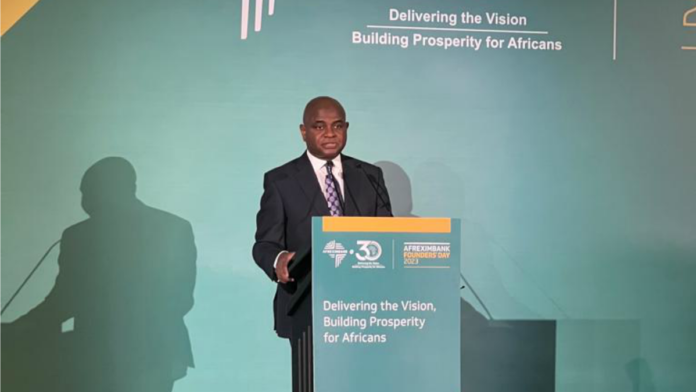Moghalu said that as we move into the era of AfCFTA-based intra-regional trade, Afreximbank should build partnerships with countries to stimulate trade policy capacity.
By Jeffrey Agbo
Former Deputy Governor of the Central Bank of Nigeria (CBN), Prof Kingsley Moghalu, has said that the African Export-Import Bank (Afreximbank) must zero in on the various aspects of the African Continental Free Trade Area (AFCFTA) so that, combined with its role and operations, it can bring about the needed continental transformation by 2050.
Moghalu, 60, stated this on Monday while delivering the 30th-anniversary Founders’ Day Lecture of the bank at Afreximbank’s headquarters in Cairo, Egypt.
He described the establishment of AFCFTA by member states of the African Union as “a watershed development in Africa’s contemporary and future positioning in world trade.”
Moghalu noted that going forward he believes the continental trade agreement would provide an enabling environment for the work of Afreximbank that would be far more powerful than was the case in the past 30 years of the bank, without prejudice to the bank’s significant achievements.
Among Afreximbank’s successes in the last 30 years, he said, is its strong network with African commercial banks to which it provides letters of credit confirmation lines in support of cross-border trade; the creation of a Pan-African Payment and Settlement System (PAPSS) to facilitate cross border payments in national currencies; and support to African countries to create/expand industrial parks in special economic zones to overcome the infrastructure bottlenecks that stunt industrialisation.
“The AfCFTA’s contributions to the African economy will be huge. It is the world’s largest free trade area, creating a single market out of 55 countries of the African Union and eight regional economic communities. The continental free trade agreement is expected to boost Africa’s income by $450 billion by 2035, and to grow Africa to a $29 trillion economy by 2050.
“The fact that 54 member states of the African Union have already signed the treaty and 46 have deposited their instrument of ratification within just five years of the signing of the trade agreement in Kigali, Rwanda in 2018 is a hopeful sign that the future can be African,” the President of the Institute for Governance and Economic Transformation said.
Moghalu further said the effect of Africa’s absence at the scene of global trade’s institutionalisation in the late 1940s and early 50s because African countries were still mainly colonies at the time, remains with the continent today. “Thus, AfCFTA has arrived to give Africa what the WTO simply was not designed to give it – a place under the sun of global trade,” said Moghalu.
READ ALSO:
Kingsley Moghalu, the ‘worldview’ man at 60
Beyond the difficulties imposed by the global trade framework on African countries, Moghalu said there are other, more homegrown obstacles that have conspired to keep Africa’s share of world trade low.
He said some of them are weak manufacturing base, low intra-regional trade, weak infrastructure, trade facilitation challenges, and quality assurance concerns.
“As we move into the era of AfCFTA-based intra-regional trade, Afreximbank should build partnerships with countries to stimulate trade policy capacity,” Moghalu said.
He also recommended that the bank should invest in specialisation and the acquisition of trade-related skills in African countries; ports facilitation and trade-related infrastructure, in particular electricity; risk guarantees for Foreign Direct Investment (FDI) in Africa among others.















